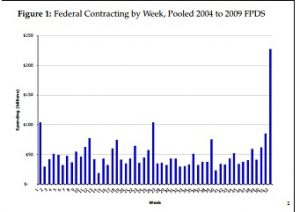
Mobile Rant
Another commodity area that really burns me up is on mobile. You are probably thinking that I am going to go on a tangent about BlackBerrys, Androids, and iPhones. I do not freaking care what flavor of device you have. That is not where the cost is. The cost is in the service to the device. I was the first one who tried to crack this code. A bunch of agencies are probably still pissed at me because they had to respond to a data call that was completely different than any other data call in history.
There are only a very few providers of service to mobile devices, Verizon, AT&T, Sprint, T-Mobile, and a bunch of bit players. These providers are happy to sell agencies fragmented service. The service that we are talking about has two components, talk and data (text was a thing a few years ago, but that is no longer a driver of price). Agencies negotiated different rates for differing levels of service at the local level.
The aspect that completely breaks this model is the concept of shared talk and shared data. Just as your family can share their talk and data, an agency can share their talk and data. But guess what, there is a lot more people in an agency than are in your family.
OMB’s first data call on this came as a result of the Digital Government Strategy. That data showed an extremely wide range of prices for the exact same level of service. OMB compared the range of monthly prices for 600 minutes of talk and 4GB of data. They would typically see agencies paying $45 per month all the way up to $120 per month per line. This is for the exact same level of service from the same provider. They then figured out how much the agency could save if all they did was move the same levels of service to the lowest cost provider within that agency. It was typically hundreds of thousands of dollars. They did this over and over in PortfolioStats. It was embarrassing how much opportunity there was to save money, all we needed was for someone to look at the data. The unfortunate thing was that they were the first people to do so.
After they kicked everyone’s asses on this data, GSA finally started to wake up. The Federal Strategic Sourcing Initiative (FSSI) wireless was identified in the Digital Government Strategy. The problem that GSA had was that they were working to award separate contracts for each agency that came a-calling. In my opinion, that wasn’t what the Digital Government Strategy was looking for. If FSSI awards a contract to Verizon for USDA and then a separate contract to Verizon for Interior, that doesn’t create the type of leverage described above. If USDA and Interior both want Verizon, there should be one single Verizon contract that they use and they should be getting talk and data out of that single pool. Today they still don’t do this.
You can probably see where I’m going with this. The point is to create pools of shared talk and data that are so big that, first, you will never have an overage and, second, you can actually lower your level of service and save additional money. Let’s play this out. An agency gets, hypothetically 600 minutes and 4GB because there is a small percentage of people who actually go over those thresholds. But most people stay way under them. However on the average, this is the level of service they need to get to avoid overage charges. As the pool gets bigger and bigger the power users’ impact is diluted more and more. Eventually you create a pool that is so large that you can actually lower the level of service without incurring overage charges. As such, perhaps you can decrease the service to 400 minutes and 2GB in a really big pool.
And there are things that an agency can do to further cut costs. For example, when we are at work, do we want our phones using 4G or 3G service? No. When you install Wi-Fi in the office you further decrease the drain on the data. Also, how many freaking telephone numbers does a person need? Look at a Federal employee’s business card. Is there one telephone number and then another for cell or mobile? Don’t get me started on FAX. COMPLETELY IDIOTIC. If we assign you a cellphone, guess what, you no longer need a land line. For me personally, I always hated having two phones. That meant I had two voicemail boxes, and, I think I mentioned already, I’m fricking lazy. I can barely be bothered to check one voicemail, let alone two. So I have pretty much always been given a desk phone, which I never use. I have also been given mobile devices. I also hate carrying around multiple devices. I put in the code for the BlackBerry to forward all calls to my personal device. I leave it plugged in and in a drawer in my desk. Other than that, I never use it. I have my desk phone forwarding everything to my personal device as well (though nobody, not even me, knows that number). I use Good to access my work email on my personal device. In essence, my personal device is my work device. This works for me because my BlackBerry number is what is on my business cards and if I ever change jobs, that number will stay with my job. It would be better and cheaper for my agency to save the money on the land line (which is thankfully an IPv6 phone), and on my cellphone. They probably pay $5 a month for the land line and $35 for my BlackBerry. It would be better for them and me if they augmented a portion of the cost for my personal device. If they paid $20 a month, then both of us are saving money.
It’s all about creating ginormous pools of shared data and talk. I’ll have a whole chapter on the Networx debacle later. But keep these thoughts in your head for when we get there.
Workstations
Agencies are really good at buying laptop and desktop computers. I’ll just refer to them generically as workstations. The problem is in the way we buy them. Yes, of course we are fragmented, but you already assumed that because everything we buy is fragmented. The problem with workstations is in the timing of our acquisition.
If you have ever met a contracting officer, he or she will likely tell you that they take it easy during quarters 1-3 because they have to work so hard in the fourth quarter. They are actually telling you the truth. The data indicate that the government is buying most of the stuff we buy in the fourth quarter. Not only that, we are buying most of the stuff in the last week of the fourth quarter.

In an article that is undeniable, Do Expiring Budgets Lead to Wasteful Year-End Spending? 9, Liebman and Mahoney have pulled the data from five years of government spending to unequivocally tell us that we are making most of our purchases on the last week of the fiscal year.
As Liebman and Mahoney point out, allowance holders like to hold onto those funds as late as they can so that they have resources available if something unplanned happens. But acquisitions take time, and wouldn’t you know it, they have held onto those funds too long. Thus in the fourth quarter they are looking for an acquisition that is reliable that they can spend it on. Notice the spike at week 52, and another spike at week 1? I would actually argue that those are the same spike. In the financial system there may be a lag in the data that is reported but that spike in week 1 is actually still part of the week 52 spike. The acquisition decisions must be made, but people often back date the documents in the first week of the new fiscal year. As a result, we are buying a lot of stuff in that last week.
I’m an IT guy. I never have enough money to do all that I want or need to accomplish. You can almost always spend your extra cash on IT. And the easiest thing to buy is a workstation. At this point they don’t care that the workstations we are replacing are only two years old. We have money today, we might not have the money to replace those workstations next year, so this is an investment for the future. The problem is that we never get the life cycle that we need out of the equipment. When an agency needs to move money, workstations is the most reliable way to spend a bunch of money.
I like what OMB is trying to do with the Laptop and Desktop Memo, M-16-02 11. They are hitting all of the basic things that we should be doing, aggregating our acquisition, standardizing the acquisition. The problem is that we need to put CIOs on a diet. We need to force CIOs to identify their refresh rate for workstations.

Look at M-16-02 again. I will know the standard configurations and I will have a pretty good idea of the unit price for each workstation. From the OPM data I know how many people (employees and contractors) work in each agency. Separately, as I already describe in this chapter, I should know how many workstations are currently found in the agency from the CDM dashboard. If I can get each CIO to identify the refresh rate he has agreed to for his or her organization then I can use this data to identify a workstation spending cap. These funds will no longer be able to hide in unnecessary end of the year workstation acquisitions.The trick here is not in trying to get CIOs to buy up to the threshold. The trick here is to preclude them from buying above the threshold.
Sorry [insert agency name], you already hit your workstation cap for the year. This won’t cure agency’s tendency to buy at the end of the year, but it will take away the most dependable vehicle that enables that bad behavior.
The other thing on workstations that I would like to bring up is the logistics nightmare. Once you make your order you are going to get a whole lot of equipment. I remember working at an agency and we would have to give up a couple of conference rooms because we would get these laptops and there were so many of them, and they had to be imaged, configured, assigned property passes, and eventually assigned to people. It was completely crazy. Invest the time to think about the image you want the machine to arrive with, that will take a very tedious step out of the process. Then, please, for the love of God, will someone please invent a better way to manage the property and who it is assigned to. I need to be able to produce my property pass, but I need to not store the pass in the laptop bag that I use to transport it. I’m pretty sure I don’t need the dumb piece of paper. Every time I get queried about a property pass, all I can think about is Colonel Klink from Hogan’s Heroes saying, “Papers” with a German accent.
